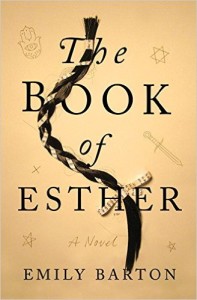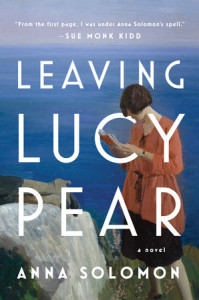From My Bookshelf: Looking Ahead During Women’s History Month
As mentioned today on the Fig Tree Books blog, March is Women’s History Month here in the USA (and today is International Women’s Day), which means that it’s an especially propitious moment to consider women’s contributions to American Jewish fiction. And the Fig Tree blog post does a good job doing that (if I say so myself).
Here on the My Machberet blog, I’d like to shift focus slightly and alert you to some forthcoming fiction titles by American Jewish women. (Disclosure: All three authors are friends of mine.)
In order of publication:
 Emily Barton‘s The Book of Esther is animated by this premise: “What if an empire of Jewish warriors that really existed in the Middle Ages had never fallen—and was the only thing standing between Hitler and his conquest of Russia?” What if, indeed? The Book of Esther is billed as “a profound saga of war, technology, mysticism, power, and faith. This novel—simultaneously a steampunk Joan of Arc and a genre-bending tale of a counterfactual Jewish state by a writer who invents worlds ‘out of Calvino or Borges’ (The New Yorker)—is a stunning achievement. Reminiscent of Michael Chabon’s The Yiddish Policemen’s Union and Philip Roth’s The Plot Against America.” Sounds good to me! This novel, Barton’s third, will be out in June.
Emily Barton‘s The Book of Esther is animated by this premise: “What if an empire of Jewish warriors that really existed in the Middle Ages had never fallen—and was the only thing standing between Hitler and his conquest of Russia?” What if, indeed? The Book of Esther is billed as “a profound saga of war, technology, mysticism, power, and faith. This novel—simultaneously a steampunk Joan of Arc and a genre-bending tale of a counterfactual Jewish state by a writer who invents worlds ‘out of Calvino or Borges’ (The New Yorker)—is a stunning achievement. Reminiscent of Michael Chabon’s The Yiddish Policemen’s Union and Philip Roth’s The Plot Against America.” Sounds good to me! This novel, Barton’s third, will be out in June.
In Anna Solomon‘s Leaving Lucy Pear, the action  begins one night in 1917, when “Beatrice Haven sneaks out of her uncle’s house on Cape Ann, Massachusetts, leaves her newborn baby at the foot of a pear tree, and watches as another woman claims the infant as her own. The unwed daughter of wealthy Jewish industrialists and a gifted pianist bound for Radcliffe, Bea plans to leave her shameful secret behind and make a fresh start. Ten years later, Prohibition is in full swing, post-WWI America is in the grips of rampant xenophobia, and Bea’s hopes for her future remain unfulfilled. She returns to her uncle’s house, seeking a refuge from her unhappiness. But she discovers far more when the rum-running manager of the local quarry inadvertently reunites her with Emma Murphy, the headstrong Irish Catholic woman who has been raising Bea’s abandoned child—now a bright, bold, cross-dressing girl named Lucy Pear, with secrets of her own.” Leaving Lucy Pear will be published in late July; you may recall Anna’s debut novel, also a work of historical fiction, titled The Little Bride.
begins one night in 1917, when “Beatrice Haven sneaks out of her uncle’s house on Cape Ann, Massachusetts, leaves her newborn baby at the foot of a pear tree, and watches as another woman claims the infant as her own. The unwed daughter of wealthy Jewish industrialists and a gifted pianist bound for Radcliffe, Bea plans to leave her shameful secret behind and make a fresh start. Ten years later, Prohibition is in full swing, post-WWI America is in the grips of rampant xenophobia, and Bea’s hopes for her future remain unfulfilled. She returns to her uncle’s house, seeking a refuge from her unhappiness. But she discovers far more when the rum-running manager of the local quarry inadvertently reunites her with Emma Murphy, the headstrong Irish Catholic woman who has been raising Bea’s abandoned child—now a bright, bold, cross-dressing girl named Lucy Pear, with secrets of her own.” Leaving Lucy Pear will be published in late July; you may recall Anna’s debut novel, also a work of historical fiction, titled The Little Bride.

Rachel Hall‘s Heirlooms “begins in the French seaside city of Saint-Malo, in 1939, and ends in the American Midwest in 1989. In this collection of linked stories, the war reverberates through four generations of a Jewish family. Inspired by the author’s family stories as well as extensive research, Heirlooms explores assumptions about love, duty, memory and truth.” Heirlooms will be published in the Fall of 2016 by BkMk Press as the most recent winner of the G.S. Sharat Chandra Prize for Short Fiction. I’ve had the good fortune of reading the manuscript, and I can tell you that this book won’t simply make my list for favorite reads of 2016; it has secured a place on my list of favorite books, forever.
